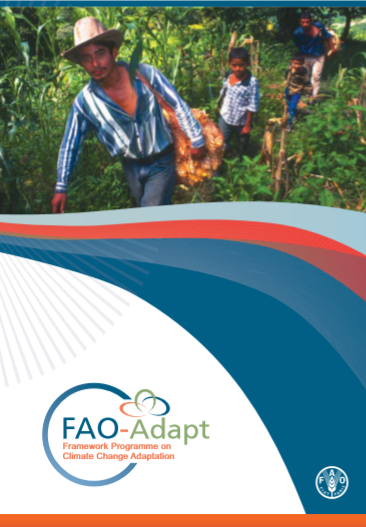FAO-ADAPT FRAMEWORK PROGRAMME ON CLIMATE CHANGE ADAPTATION

The increasing spectre of soaring food prices and global warming has brought food security and climate change concerns to the top of the international agenda. Agriculture – namely its agriculture, forestry and fisheries sectors – now faces the double challenge of dealing with the impact of climate change at the same time that it must increase production to meet the food demands of a global population projected to reach 9.1 billion by 2050. Looking ahead, FAO recognizes that these two challenges must be addressed together. Climate change adaptation, a must for the agricultural sectors, will require substantial technical and financial investments in order to achieve food and nutrition security, particularly in food-insecure developing countries.
FAO has more than six decades of experience dealing with climate-related issues. Today, as the world seeks ways to cope with human-induced climate change, FAO has established its position as a global organization with broad understanding of the issues as well as the necessary organizational infrastructure and expertise to support members in adapting their agricultural production to new climate realities.
With respect to climate change adaptation in agriculture, forestry and fisheries, FAO has taken significant and concrete initiatives that provide multiple benefits. FAO provides implementation support to more than 50 global, regional, national and local projects designed specifically to address climate change adaptation, climate-related disaster risk management or a combination of adaptation and mitigation. This means that while these activities reduce existing adaptation deficits and lay a foundation for longterm resilience, they will simultaneously enhance sustainable production increases and food security.
FAO does substantial normative work, developing methods, tools and approaches for climate impact assessment and adaptation. It has a long track record of collecting, processing and applying geospatial information on natural resources and climate as well as data and information on the potential and actual production of food, the state of the world’s fisheries and forests, and of its water, land and genetic resources. In many cases, FAO is the main source of this information which is essential for formulating adaptation baselines and strategies.
FAO contributes to global and regional climate change negotiations and discussions advocating for better reflection of agriculture and food security. It works with and provides information to a host of global organizations and instruments involved in adaptation. Ensuring that the nations of the world are prepared to adapt to changing climates is a critical step in FAO’s ongoing efforts to achieve global food security.
- Publisher: FAO Download

